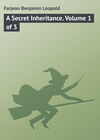Czytaj książkę: «The Betrayal of John Fordham», strona 17
CHAPTER XXXI.
PAUL GODFREY, DETECTIVE, CONTINUES HIS NARRATIVE
The motive – the motive. This was the subject of my thoughts as I walked from the Cemetery. What possible motive could Maxwell have in making John Fordham believe that his stepmother was dead? If she were living, Fordham could have nothing to hope from her; if she were dead, it was an obstacle removed from his path, a witness the less against him. It was not likely that Maxwell was anxious to afford him this satisfaction; there was a cunning motive for the deceit, but though I twisted the question a dozen different ways, I could not make head or tail of it.
Puzzling my head over the matter, I found myself in the neighborhood of Soho.
It was not chance that directed me there. I had not forgotten the woman, Annette Lourbet, who plays so important a part in John Fordham's confession, and though she seemed to have passed out of the story at about the time he left England for Australia, I had an idea, if I succeeded in discovering her, that I might obtain some useful information. I hardly knew in what shape, but in such a task as mine the slightest clue frequently leads to a momentous result.
Up to this day my search for. Annette had been unsuccessful. Of course, I had looked through the London Directory for the name of Lourbet, but curiously enough, it did not appear there, and I concluded either that the woman had married or had returned to her native country. If she had married and was still in London, Soho was the most likely neighborhood in which to find her, and I had already spent several fruitless hours in those narrow thoroughfares. My patience, however, was not exhausted, and I was now treading them again in the hope of a better reward.
I think I may say that hitherto chance had not befriended me, but on this day it did me a turn, and in a singular way. About to pass a continental provision shop, of which there are a great many in Soho, and in the windows of which was the usual display of German sausages, pickles, potted meats, French mustard, pretzels, Dutch herrings, cucumbers, etc., I was obstructed by a ladder, and had to cross the road. A sign-painter was at work on the ladder, and glancing at the board over the window, I saw that a name had been erased and was being replaced by another, the first letter, L, having just been painted in bright blue. I walked on, attaching no importance to the incident; but when, half an hour afterwards, I passed the shop again, and saw that the painter had got as far as L O U, something like an electric shock darted through me.
L O U, the first three letters in the name of Lourbet.
I did not linger; the next minute I was in an adjoining street. The shop would not run away, and the proprietor would not run away. I could afford to wait.
I did wait for an hour and more before I sauntered again through that particular street. The sign was finished, and stared me in the face. I could have hugged myself when I saw the full name of Lourbet on the signboard.
Now, was the name that of a woman, and was her Christian name Annette? Half a dozen persons were looking up at it in admiration of the painter's skill. One, however, a little man who appeared to have been drinking was regarding it with wrath and dissatisfaction; he even went so far as to shake his fist at it. He was a most disreputable looking character, and evidently a confirmed toper. As he held up his fist a woman darted from the shop, and standing at the door fired one word at him.
"Pig!"
In response to which he directed his fist towards her face. This so inflamed her that she flew at him, and, seizing him by the collar, shook him with such violence that he fell to the ground the moment he was released. By this time a crowd had gathered, whose sympathies were entirely on her side. They jeered and laughed at the man, with whom they appeared to be acquainted, and who lay in a state of collapse. Not that he was hurt, except, as a matter of course, in his feelings, but he was afraid to rise and risk a second shaking at the hands of the woman, who seemed to be smarting under a sense of injury. To my surprise she became suddenly quite calm and composed, and stood looking down upon him with a disdainful smile on her thin, white lips.
"It is well done, Madame Lourbet," cried a Frenchwoman in the crowd. "It is as he deserves. I would wring his neck if he had served me so."
"Thank you, madame," replied Madame Lourbet, "for the name. It is my own. Behold it, pig!" Addressing her discomfited foe, and pointing to the newly-painted sign. "I r-r-renounce you. Come to me no more. Begone!"
There was a melodramatic touch in her words, but not in her utterance of them. Had I not witnessed it I could hardly have believed that they were spoken by the woman who had behaved with so much violence. The cold, passionless voice was, in my judgment, the result of long training, and I detected in her so many little resemblances to the Annette portrayed by John Fordham in his confession that I did not doubt I had found her at last. I was careful to keep out of her sight, having determined to seek enlightenment first from the man, for I was curious to learn the meaning of this singular scene.
The approach of a policeman put an end to it. The crowd dissolved, Madame Lourbet returned to her shop, and the man, whose furtive looks had followed her movements, slowly picked himself up. If he had been inclined to appeal against the judgment which had been pronounced he was manifestly not in a condition to do so just now; seemingly recognizing this, he slunk off with the air of a whipped cur.
The policeman took no notice of him, and was soon out of sight; I kept in his track till he halted at the door of a public-house and fumbled in his pockets. Finding nothing there he relapsed into a state of maudlin despair. This was my opportunity, and I took advantage of it. Over a friendly glass or two, he drinking my share and his own with cheerful alacrity, he ventilated his grievances.
Annette was his wife, so ne declared; they had lived together three years; she had worshiped the ground he trod on, and his name had been painted over the shop window. And now, after he had ruined himself for her (he did not specify in what way) she turned upon him and cast him adrift. He would not stand it – no, he was an Englishman, and he would not stand it. She was tired of him, was she? She had another lover, had she? He would have his blood. And so on, and so on.
The real fact was that there had been a trifling informality in the marriage, the man I was pumping being married already when he went through the ceremony with Annette. It was true that his first wife died shortly after he married his second, but Annette had only lately discovered that her own marriage was illegal, and being tired of the rascal was glad to be quit of him. She had been prudent enough to protect her savings; the business was hers, the stock was hers, and she had turned him out with never a penny in his pockets.
"Not a penny, not one single penny," he whined. I sympathized with him, of course, and I left him at his lodgings – a garret in the same street as the shop – with a promise to call upon him the next night and see if anything could be done to soften Annette's heart.
The information I had extracted from him was not of much present use to me, but I saw the possibility of the acquaintanceship being of service, and I was by no means dissatisfied with my day's work; but the day was not yet over. I have good reason to remember it, and so has every person associated with the mystery, so many strange things occurred – the strangest of all (which at first seemed to have not the slightest connection with the affair) leading to a most surprising and unexpected discovery.
It was my intention to pay Madame Lourbet a visit, and I thought that evening would be the best time. I had business to transact at my office, for this Liverpool murder, though it occupied so much of my time, was not the only thing I had to attend to. So to my office I went and spent a useful hour in straightening my affairs and giving instructions to my clerk. Then I sat down to catch up arrears of correspondence, and by four o'clock I had everything in order. I had put away my papers and stamped the last of my letters when my clerk announced a lady – Mrs. Barlow, who was most anxious to see me. She was shown in, an elderly lady, with a careworn face and ladylike manners. She had been recommended to me, as a likely person to discover her son, whom she had not seen for five or six years.
"Nor heard from him?" I asked.
"Not a line," she answered in a sad voice.
"Is he in England?"
"I do not know."
"Well, tell me all about it," I said, "and bear in mind that your time and money will be thrown away if you keep anything in the background."
I condense what she related. She was a widow, with one child, this son who had deserted her. He had always given her trouble. Not that he was bad at heart, but so easily led away, believing in everybody, trusting everybody. (Mother's love, here; I knew its value in a practical sense.) Unfortunately he had fallen into bad company, and her belief was that he was ashamed to return to her. Years ago they had been fairly well off, but little by little he had got from her all she was worth, and then he left her. She managed to rub along, however, being assisted by Philip's uncle, her deceased husband's brother. This uncle had lately died and left her a small legacy, which she had received. A legacy of three thousand pounds was left to Philip; in case of his death at the time of the testator's decease the money would go to a charitable institution. Philip had not presented himself to claim the legacy, and she was naturally anxious to discover him, so she had come to me to assist her.
A simple story, before the end of which I had made up my mind about the man. A thoroughly bad lot – an opinion I kept to myself, however.
I put a few questions to Mrs. Barlow.
"Can you think of any reason why your son should not come forward to claim this fortune?"
"No."
She was afraid to express what must have been in her mind – that he was dead.
"He fell into bad company, you say. What kind of bad company? I must press for an answer."
"Unfortunately he was fond of cards."
"Blacklegs got hold of him, then?" She sighed. "Did he bet on horses?"
"Yes."
"That explains a great deal. He went to races and lost his money?"
"Everybody took advantage of him."
"I see. Now, Mrs. Barlow, if I take this matter up I must have a free hand. Among other things I shall do I may have to advertise. If you have any objection, you had best say so at once."
"You may do anything you like – only discover my son for me."
"Very well. Have you a portrait of your son?"
"Yes – a cabinet in a frame. I did not bring it with me."
"Send it immediately to my private address. I should like it soon."
"You shall have it to-night. I will bring it myself."
I gave her my private card, and took five pounds from her for preliminary expenses.
She was about to leave, when she turned and said:
"Perhaps I ought to tell you that a friend mentioned that he thought he saw Philip."
"Certainly you ought to tell me. The mischief of these cases is that there is always something kept back. Where did he see him?"
"In Liverpool, but he is not certain it was Philip."
"Very stupid of him. How long ago was it?"
"Over a year ago."
"Is that all?"
"Yes, that is all," she said, and bade me good-day.
Before I left my office I wrote an advertisement for the personal columns of the daily papers, to the effect that if Philip Barlow called upon or communicated with me, he would hear of something very much to his advantage. Instructing my clerk to insert the advertisement in three of the principal newspapers, I went to my lodgings and made a change in my appearance, which I deemed prudent, in view of my visit to Madame Lourbet.
That lady was not in her shop when I entered it. In response to a rap on the counter, she issued from an inner room, and asked what I required. There was a glass panel in the door of this room, across which a green curtain was drawn. I have a faculty of observation which enables me to see a great deal at a glance.
While I was making a few small purchases, I entered 'into conversation with her. I said that I had been recommended to her shop, but had some difficulty in finding it, in consequence of the name over the window being altered. She admitted the alteration, and said that the business would in future be conducted under the new name.
"Your own name, I presume, madame?" I said.
"My own name," she answered. "It makes no difference in what I sell."
"None at all," I said, briskly. "You were spoken of, I remember, as Madame Annette."
"That, also, is my name. May I ask, monsieur, by whom you were recommended?"
I watched her face keenly as I replied, "Madame, or rather, Mrs. Fordham."
As I uttered the name I observed a slight disturbance of the green curtain.
"Pardon me, monsieur," she said, and went into the private room, the door of which she carefully opened and shut.
"Now," thought I, "what is the meaning of this, and will it make any difference in Madame Lourbet's behavior?"
It made a perceptible difference. Something had passed between her and the person in the inner room which had put her on her guard, and she was watching me now as keenly as I was watching her.
"Madame Fordham," she remarked, with assumed indifference, continuing our conversation. "Who is Madame Fordham?"
"I supposed she was a customer of yours," I answered.
"It may be," she said. "Oh, yes, it may be; but does one know all one's customers?"
"That would be difficult," I said, laughing, "with such a connection as you have, madame."
"You are right, monsieur, it would be difficult. Do you require anything more?"
"Nothing more, thank you, madame."
She let an arrow fly. "I will send the articles home and the bill, if monsieur will kindly give me his address."
"Much obliged, madame," was my reply: "I will pay for them, and take them with me."
So the little passage at arms ended, and I walked away just a trifle wiser than I came, for I had learned that Madame Lourbet did not desire to talk about John Fordham's stepmother, and that there was some person behind the green curtain who also had an interest in the matter. Had I deemed it safe I would have kept watch for that person outside Madame Lourbet's shop, but I felt that I was dealing with a woman as clever as myself, and I recognized the necessity of caution. It was annoying, but there was no help for it.
The day had been one of the busiest in my recollection, and I was glad to sit down to a cup of tea in my own private apartment. During the meal I was debating how the incidents I have recorded could be turned to advantage, when the landlady came in and informed me that a man was down-stairs who insisted on seeing me. She did not like to let him up, she said, he was such a common-looking man; besides, he was the worse for liquor. But he would not go away.
"I did all I could, sir," said my landlady, "but go he wouldn't. 'Tell him it's Jack,' he said."
"Jack!" I cried, interrupting her. "Show him in at once, and don't let us be interrupted; I have business with him."
Much astonished, she departed on her errand, and the next minute Jack stood before me.
My first impression was that the landlady was right, and that Jack had been drinking. His face was as white as a sheet, his eyes glared, and his limbs shook like a man in a palsy.
"You're a pretty object," I said, sternly; but he did not seem to hear what I said.
"Guv'nor," he gasped, in a horse voice, "is that tea? Will yer give me a cup? My throat's on fire."
"Well it might be," I answered, filling a cup, "but I should have thought brandy was more in your way. You'll come to a bad end, my lad."
Still he did not seem to understand me, but took the cup with his shaking hands, holding it in both lest it should slip to the ground. As it was he spilled half of it before it reached his mouth. I took the cup from him, and placing it on the table said:
"Now, what is the meaning of this? How dare you come here in such a state?"
"Give me time, guv'nor, give me time," he croaked. "I shall be better in a minute. Yer think I've been drinkin'. Yer wos never more mistook. I 'ad a pint o' mild this mornin', but I 'ope I may drop down dead if another drop 'as passed my lips the 'ole of this blessed day. I've 'ad a scare, guv'nor – I've 'ad a scare." He dropped his voice, and bending forward, said: "Did yer ever see a ghost?"
"Not that I'm aware of, Jack. You look as if you'd seen one."
"I 'ave, guv'nor."
"Ah," said I, becoming interested, in spite of my suspicion that he was drunk, his manner was so earnest, "whose ghost?"
"The ghost of 'im as wos murdered. The ghost of Louis Fordham."
"You are dreaming, Jack," I said, staring at him.
"Not me, guv'nor. I'm wide awake, I am. Oh!" He gave a sudden start, and turned his head over his shoulder, as though a spirit was standing behind him.
"You see one now, perhaps," I said.
"No, guv'nor, but I don't know as 'e mightn't appear in this wery room. Is there such things, or am I goin' mad?"
"Not unlikely, Jack, when you come to me with such a cock and bull story. I recollect your saying that you'd seen the murdered man lying on a green field and on a billiard table. This is something of the same sort, I suppose."
"No, guv'nor, that was a wision, and I knew it wosn't real. But this wos. I touched it as it passed."
"Oh, it passed you, did it? Come, my man, let us have the whole of it; I may understand it better then. Where were you, what time of day was it, and in what shape did it appear to you?"
"The shape wos 'is own, and the time o' day was four this arternoon, and the place wos Finchley Road."
"Go on, Jack," I said, seeing that he believed in it.
"I was out with the barrer," he continued, "and was bargainin' with a lady for some daisies. There they wos on the pavement, and she and me lookin' at 'em. As I stooped to pick up a pot, somethink brushed by me. We touched each other. Lookin' up I sor Louis, and the pot dropped from my hand."
"Did you go after him?"
"Me go arter 'im. I'd 'ave run a 'undered miles the other way."
"Did he vanish in blue flames, Jack?"
"No, guv'nor. 'E turned a corner."
"But, consider, my lad. The man is dead."
"Don't I know it?" cried Jack, as if my remark exasperated him. "Is it likely I should 'ave come to you if 'e'd been alive?"
"You looked up at him, you say. Did he look down at you?"
"No, guv'nor, not that I noticed. D'yer think I've been makin' up the story?"
"No, I don't think that, because there's nothing to gain by it. What I do think is that you've been scared by seeing some one who bears a resemblance to Louis. It isn't at all an uncommon thing. Innocent men have been hanged upon such evidence."
"Guv'nor," said Jack, impressively, "it wos 'im, I tell yer. There wos 'is 'eight, there was 'is build, and there wos the scar on 'is fore'ead. I'll take my Bible oath it wos Louis' ghost."
"Even the scar may be on the other man's forehead," I persisted. "There have been much closer resemblances. A dozen witnesses have sworn to the identity of a man who was being tried for a crime of which he was as innocent as I am, have sworn to his voice, to the color of his eyes and hair, to secret marks upon his person, to a missing tooth, to the peculiar shape of his fingers, and he has been condemned upon their evidence. Only after his death has it been discovered that the wrong man had been hanged. Wives themselves have been taken in, and have lived for years with men they believed to be their husbands. Go home, Jack, and think of these cases, much more wonderful than your accidental resemblance, and don't make a fool of yourself."
I might as well have spoken to a stone. Jack was not to be argued out of his fright, and that it was genuine was proved by the startled looks he cast behind him from time to time. A gentle tap at the door sent his heart into his mouth. It was my landlady, who came with a parcel that had been left for me by a lady, who wished to hand it to me herself, but was told I was engaged and could not be disturbed. As I had exhausted all my arguments upon Jack, and as he did not seem in a hurry to go, I opened the parcel in his presence, and drew out the cabinet portrait of Mrs. Barlow's missing son which she had promised to bring to my lodgings.
"Send I may live, guv'nor!" cried Jack, peering at it over my shoulder, his eyes almost starting out of his head, "where did you get that from?"
"It's the picture of a missing man, Jack," I replied, "who has had a lump of money left to him. I want to lay my hands on him." It was then that I noticed the strange expression on Jack's face, and I added, jokingly, "It isn't a ghost."
"No, it ain't a ghost," he said, "it's Morgan."
"Morgan!" I exclaimed. "Your card-sharping Liverpool friend?"
"That's 'im, guv'nor. A lump o' money left 'im! Why don't 'e come and collar it?"
"Are you sure you are not mistaken?" I asked.
"'Ow could I be mistook?" he demanded. "Wosn't 'im and me together day and night for weeks and weeks? I'd swear to 'im among a 'undered."
Reluctant as I was to take Jack's word for Louis' ghost, I could not dispute with him as to Morgan's portrait. It was long before I could get rid of him, and he went away as firmly convinced of one as he was of the other. In such positive terms did he express his conviction on the former subject that if I were not a hard-headed, practical man, with very little sentiment in my nature, it is quite on the cards that he would have shaken my belief that he was laboring under some monstrous delusion in respect of the murdered man. At the same time I confess to being curious about Louis' "double," and to having a desire to see him with my own eyes. It was for this reason, on the chance of being gratified, that I made an appointment to accompany Jack the next day in his peregrinations through the N. W. district, in the disguise of a brother coster. The hour of appointment was noon.
Meanwhile there was much to think of, much to do. Fortunately I am a healthy man and can do with three or four hours' sleep, or I should never have got through with it.
There was in my mind the design, not yet thoroughly planned out, of having Louis' body exhumed, in order that its identity might be established beyond the possibility of doubt. This would effectually dispose of Jack's fancies, which, after further reflection, I set down to the stings of conscience, and as properly belonging to that form of imaginative creation which had conjured up the vision of Louis' body lying on a billiard cloth and on green fields. To establish this identity witnesses would be required. I could give evidence as to the scar upon the forehead, but only from what I had been told; it would be secondary evidence, and therefore not admissible. I mentally ran through the names of the witnesses whose evidence, from personal knowledge, would be of value.
John Fordham, for one. Though it might tell against himself, he would be ready and willing to testify. I needed nothing to convince me that he was a truthful and honorable man who would not palter with his conscience even though it added to the peril in which he stood.
Then, Jack. But it would bring him into danger. A far different character he from Fordham. He would be dragged forward against his will, and in these circumstances his word could not be depended upon. In the present aspect of the affair his was the only evidence upon which Fordham's innocence could be to some extent proved. Believing himself to be in danger such a man as Jack would be capable of anything; he might deny all that he had admitted, he might even concoct a story which would throw the entire guilt upon the man I was trying to save. Therefore, Jack's evidence upon this question of identity could not be reckoned with just now. For a time at least it must be set aside.
Then, Louis' mother. But her son's name had appeared in the papers as that of the man whom, by Fordham's confession, he had murdered. It must not be forgotten that I was convinced she was living. That being so, why was she silent? Why did she remain in hiding? That was one of the unanswered questions in the Mystery.
Then, Maxwell. Also in hiding. He, of all who were associated in the mystery, was the least likely to come forward of his own free will. Then, Morgan —
At his name my reflections were diverted into another channel. Three thousand pounds was a handsome sum – a Godsend to such a man. Why had he not claimed it? There was more than one answer to the question. He might not be aware of his uncle's death; as his own mother did not know his address the solicitors to the will could not communicate with him. He might be dead; he might have left the country. If he were living would my advertisement in the personal columns of the newspapers be successful in unearthing him? It occurred to me that it would increase my chances of success if I advertised for him in his assumed name, and I drew out the following advertisement: —
"A Large Sum of Money has been Bequeathed to – Morgan, who is supposed to have been residing in Liverpool, where he was last seen about a year ago. Full particulars will be given to him upon application to Paul Godfrey, 719 Buckingham Palace Road."
To reduce the chances of receiving letters from every Morgan in the kingdom, I wrote to Mrs. Barlow, requesting her to give me the date of her son's birth, his age, and whether he had any marks on his person by which he could be identified. Though it is running ahead of my narrative, I may state here that Mrs. Barlow supplied me with the date of her son's birth and his age (which particulars I inserted in the advertisement), and informed me that there were two marks on him which would render identification easy – a large mole on his left side, a little above the hip, and a peculiar formation in the toe next to the big toe on his right foot. It was bent completely under, she said, and presented the appearance of having been cut clean off at the joint.
I went out at eleven o'clock that night to post my letters to Mrs. Barlow, and was returning home, deep in thought, when a hand was laid on my shoulder.
"Good evening, Godfrey."
The voice was Wheeler's, like myself a private detective, with whom I had worked on two or three cases. There was a talk of our going into partnership, but it had not yet come to a head. There are few smarter men than Wheeler.
"Good evening," I said, and immediately began to consider whether he could be of use to me. "Anything stirring?"
"Well," he answered, "I was coming to see you."
"What about?"
Instead of giving me a direct answer, he began to laugh, and said, "You were in Soho this evening."
"Hallo," said I, interested immediately, "there's something in the wind. Did you see me there?"
"No, but I saw you coming into Leicester Square."
"How did you find me out?" I asked, rather nettled. "I thought my disguise a good one."
"So it was. There isn't one in a thousand who would have recognized you. I happen to be that one. You see, Godfrey, when you are thinking of something very particular, you have a nasty habit of stroking your chin with the middle finger of your right hand."
"Good," said I, "you will never catch me doing that again when I'm somebody else. Well?"
"Seeing that, I took special notice of you, and followed you home to make sure. When you stopped at 719 Buckingham Palace Road, and let yourself in, I was satisfied it was you."
"There's nothing very smart in that."
"I don't say there is. I kept myself out of sight, for a reason you'll appreciate."
"Out with it."
"I wasn't the only one who was following you."
"You don't mean to say I was being shadowed?" I cried, excitedly.
"That is exactly what I do mean. 'I'll see this out,' said I to myself."
"Man or woman?"
"Man."
"Did you catch sight of his face?"
"Yes. Tall, dark, beard and whiskers. Might have been false. When you were in the house he passed the door, looked at the number and walked away."
"And you let him go?" I said reproachfully. "I didn't think that of you."
"You needn't. I followed him on your account."
"Bravo!"
"Had to be very careful. His eyes were in all directions."
"Did he go back to Soho?"
"No. He took a 'bus to Piccadilly Circus. I took the same 'bus. He got down there, with a lot of others, and I slipped out among them. Then he took an Atlas 'bus to the Eyre Arms. So did I. He walked towards the Swiss Cottage, and my difficulties commenced. Not much foot traffic between the Eyre Arms and the Swiss Cottage, you know. He went on to Fitzjohn's Parade. More traffic there. The job got easier. Beyond Fitzjohn's Parade, very little traffic indeed. I had to be more careful than ever, so few people about. That was the end of it."
"You know the house he went into?" I cried.
"I don't," he answered. "I am ashamed to say he gave me the slip. I don't know whether he suspected he was being followed, but the fact remains that he gave me the slip. How he managed it beats me. I am fairly ashamed of myself."
"You ought to be. Wheeler, you were on the track of a great mystery," and just at the very point – I was so annoyed that I couldn't finish the sentence.
"I remained in the neighborhood a couple of hours," he continued, "but saw nothing more of the gentleman. If I had suspected there was anything important hanging to it he would have had to be a great deal smarter than he is to throw me off the track. However, it's no use crying over spilt milk. I've nothing to do this week. Can I be of any help to you?"
"I think so," I replied. "Come and see me at eight o'clock in the morning, and I'll tell you all about it. I must have time to think this out. Though you were not entirely successful you have done me a great service, and I am obliged to you. Oh, Wheeler, if you had only seen the house he went into!"
He shook his head mournfully, and left me, promising to call in the morning.



















